|
|
|
Sort Order |
|
|
|
Items / Page
|
|
|
|
|
|
|
| Srl | Item |
| 1 |
ID:
095864
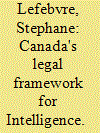

|
|
|
| 2 |
ID:
181780
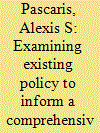

|
|
|
|
|
| Summary/Abstract |
Advances in solar photovoltaic applications demonstrate the viability of combining agriculture and solar energy production in a system known as agrivoltaics. Because scarce consideration has been given to the socio-political context of development, this study applies Legal Framework Analysis to identify barriers and opportunities for a comprehensive legal infrastructure to enable agrivoltaics in the U.S. The State of Massachusetts is used as a case study to understand what elements of their regulatory regime contribute to their novel agrivoltaic policy program, while also considering the surrounding federal and local government dynamics in which this state program is embedded. Based on the analysis results, a comprehensive legal framework for agrivoltaics should arguably include a combination of federal and state energy financing mechanisms coupled with favorable state and local land use policies. Specifically, a state-level feed-in tariff and local government allowances for mixed land use between solar and agriculture will be the key features of an enabling legal framework. The results demonstrate that multi-level, multi-sector policy integration is imperative for advancing agrivoltaics and that strategic measures to align solar energy and agricultural land use regimes can catalyze the diffusion of this promising technology in the U.S.
|
|
|
|
|
|
|
|
|
|
|
|
|
|
|
|
| 3 |
ID:
186494
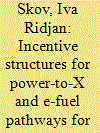

|
|
|
|
|
| Summary/Abstract |
Though Power-to-X pathways, primarily Power-to-Liquids, attract interest as solutions for decarbonising parts of the transport sector that are not suitable for electrification, the regulatory framework until recently slowed down their implementation. This paper examines the updates in the main aspects of the legal framework in the European Union from 2019 to the beginning of 2022 related to Power-to-X: support schemes, specific targets, and potential barriers. The results show increasing interest and market entrance of electrolysis and push from the different actors and regulatory parties to establish solutions that will enable faster upscaling. However, it is visible from the National Energy and Climate Plans and hydrogen strategies that the most emphasis is still on hydrogen as an end fuel for personal vehicles or power-to-gas. On the other hand, few countries have implemented legal frameworks facilitating diverse PtX pathways without focusing solely on hydrogen. Nevertheless, revisions of RED II have finally set up specific targets for electrofuels and Fit for 55 has introduced new actions supporting electrofuels in aviation and marine transport.
|
|
|
|
|
|
|
|
|
|
|
|
|
|
|
|
| 4 |
ID:
143064
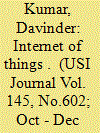

|
|
|
| 5 |
ID:
134177
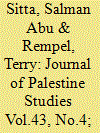

|
|
|
|
|
| Publication |
2014.
|
| Summary/Abstract |
The internment of thousands of Palestinian civilians in Israeli-run prisoner of war camps is a relatively little known episode in the 1948 war. This article begins to piece together the story from the dual perspective of the former civilian internees and of the International Committee of the Red Cross (ICRC). Aside from the day-to-day treatment of the internees, ICRC reports focused on the legal and humanitarian implications of civilian internment and on Israel's resort to forced labor to support its war effort. Most of the 5,000 or so Palestinian civilians held in four official camps were reduced to conditions described by one ICRC official as "slavery" and then expelled from the country at the end of the war. Notwithstanding their shortcoming, the ICRC records constitute an important contribution to the story of these prisoners and also expose the organization's ineffectiveness-absent a legal framework as well as enforcement mechanisms beyond moral persuasion, the ICRC could do little to intervene on behalf of the internees.
|
|
|
|
|
|
|
|
|
|
|
|
|
|
|
|
| 6 |
ID:
091237
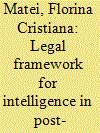

|
|
|
|
|
| Publication |
2009.
|
| Summary/Abstract |
A legal framework for intelligence delineates the rights, obligations, and powers of the intelligence organisations, as well as the arrangements for their governance and accountability, provides the intelligence system with guidance as to what it can and cannto do, indicates who is in charge and who oversees the activity of intelligence; insures that the intelligence apparatus is responsible before the law in case of abuses; makes sure that the IC benefits from legal protection if it observes the legally agreed guidance and directions.
|
|
|
|
|
|
|
|
|
|
|
|
|
|
|
|
| 7 |
ID:
192062
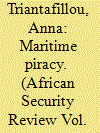

|
|
|
|
|
| Summary/Abstract |
Τhe global economic downturn during the pandemic and the current geopolitical tensions may be marking a resurgence in maritime piracy, rendering close examination of its determinants useful for the international shipping industry and for policymakers. We contribute to pertinent literature by focusing on legal factors that affect sea piracy in Nigeria and Somalia, two countries that feature prominently among the traditional piracy hotspots of West and East Africa respectively. Using data for the period 2002–2020 and panel estimation, we assert prior research by finding institutional factors, mainly corruption, and socioeconomic factors, notably youth unemployment, being conducive to maritime piracy. Specifically, we find institutional factors to be more important for Nigeria, while socioeconomic factors to stand out in the case of Somalia. The results obtained confirm our key hypothesis that in both cases examined pirates have a preference to attack ships with Western European countries’ flags, where legislation tends to be less severe in terms of punishment for the crime of maritime piracy. Our findings support the argument that to discourage pirates from exploiting differences in national legal frameworks worldwide, deterrence of maritime piracy needs to be coordinated at the international level.
|
|
|
|
|
|
|
|
|
|
|
|
|
|
|
|
| 8 |
ID:
134071
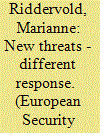

|
|
|
|
|
| Publication |
2014.
|
| Summary/Abstract |
When the European Union (EU) launched its first military naval mission, EU NAVFOR Somalia, Atalanta, the states who are members of both the EU and the North Atlantic Treaty Organization (NATO) made a political choice: to prioritize the EU over NATO in their multilateral military efforts to fight piracy and its consequences. Thereby, Atalanta challenges the conventional assumption that EU security cooperation will remain limited. It also challenges the widely held belief that the European states will chose to act through NATO if dealing multilaterally with international security issues. How can we explain this decision? This analysis suggests that it can be explained in two phases where different mechanisms were at work. In the first phase, which can be accounted for from a neo-realist perspective, France, who held the Presidency, used particular favorable geopolitical conditions to put an autonomous EU operation on the agenda. However, agreement on the EU option cannot be explained as a result of strategic bargaining. Instead, in a second phase and in line with an alternative hypothesis building on the theory of communicative action, the EU member states came to support the French suggestion due to legitimacy considerations regarding the legal framework of the two operations
|
|
|
|
|
|
|
|
|
|
|
|
|
|
|
|
| 9 |
ID:
133231
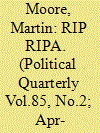

|
|
|
|
|
| Publication |
2014.
|
| Summary/Abstract |
This collection of pieces addresses questions raised by the Snowden revelations and their aftermath. All the authors were participants at a round-table discussion at King's College London on Thursday 20 March 2014. The round table was chaired jointly by Sir Lawrence Freedman and Lord [Peter] Hennessy. Those participating were: Baroness [Onora] O'Neill, Lord [Ken] Macdonald, Nigel Inkster, Professor Thomas Rid (King's College), Ewen MacAskill (The Guardian), Gordon Corera (BBC), Jemima Stratford QC, Peter Horrocks (BBC), Charlie Edwards (RUSI), Professor Jean Seaton (Westminster University), Bill Peace (King's, ex-SOCA), Air Vice-Marshal Andrew Vallance (DA-Notice), Carl Miller (DEMOS/King's), Lord (Alex) Carlile and Richard Sambrook (Cardiff University).
|
|
|
|
|
|
|
|
|
|
|
|
|
|
|
|
| 10 |
ID:
134178
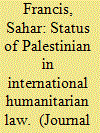

|
|
|
|
|
| Publication |
2014.
|
| Summary/Abstract |
This essay addresses the legal status of Palestinian political prisoners under international humanitarian and human rights law. At the heart of this issue lies the fundamental question of Israel's right to arrest hundreds of thousands of Palestinians, put them on trial before arbitrary military courts, and treat them as criminals in its capacity as the occupying power given the internationally-recognized right of Palestinians to resist occupation and pursue self-determination. This question takes on all the more urgency considering the illegal nature of the Israeli occupation1 and given that the laws and rules of war are applicable to Palestinian detainees as their status conforms to the definition of prisoners of war and civilians under occupation pursuant to the Geneva Conventions of 1949.
|
|
|
|
|
|
|
|
|
|
|
|
|
|
|
|
| 11 |
ID:
090637
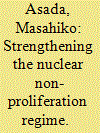

|
|
|
|
|
| Publication |
2009.
|
| Summary/Abstract |
Since around the turn of the century, the Nuclear Non-Proliferation Treaty (NPT) has suffered fundamental challenges from several quarters, which has led to a number of proposals to reinforce the non-proliferation regime. Among the most effective are a ban on sensitive nuclear transfers and the universalisation of the Additional Protocol. The former proposal, although not agreed upon in the NSG, has been virtually realised as a moratorium within the G-8 framework. It would be advisable for the G-8 to do the same with regard to the latter proposal.
|
|
|
|
|
|
|
|
|
|
|
|
|
|
|
|
|
|
|
|
|